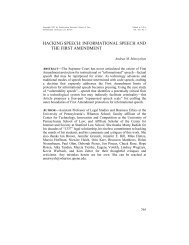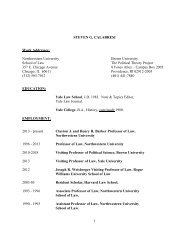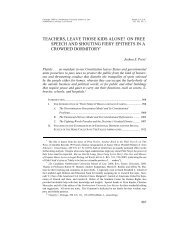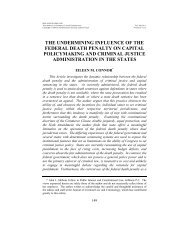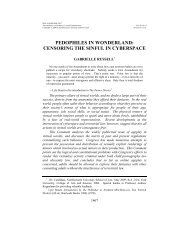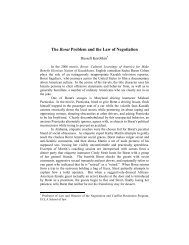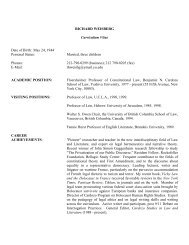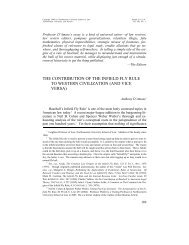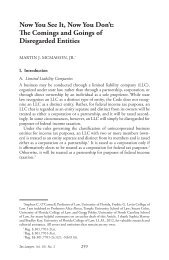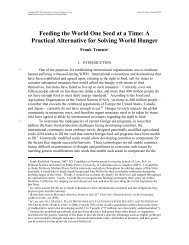The Reverse Triangular Merger Loophole and Enforcing Anti
The Reverse Triangular Merger Loophole and Enforcing Anti
The Reverse Triangular Merger Loophole and Enforcing Anti
Create successful ePaper yourself
Turn your PDF publications into a flip-book with our unique Google optimized e-Paper software.
1066<br />
N O R T H W E S T E R N U N I V E R S I T Y L A W R E V I E W<br />
creased due diligence in obtaining the necessary third-party consents in a<br />
reverse triangular merger transaction will result in increased transaction<br />
costs for each party. Despite these increased costs, erring on the conservative<br />
side by requiring consent from all third parties reduces potential litigation<br />
<strong>and</strong> helps parties underst<strong>and</strong> the viability of the proposed reverse<br />
triangular merger. Oftentimes, a proposed merger or acquisition “gets<br />
canned or valued down” following conflicts over intellectual property<br />
rights, personnel contracts, or contract incompatibilities in integrating the<br />
two companies. 178 Because of the benefits 179 of reverse triangular mergers,<br />
there is a tendency to underestimate the complexity of integrating two systems<br />
or changing over to a new system entirely. Requiring third-party consent<br />
in reverse triangular mergers is critical to curbing “potential risks <strong>and</strong><br />
red flags.” 180 In an economy where the average life cycle of a product is<br />
only eighteen months from launch to death, arguing about a nonmerging<br />
party’s contractual anti-assignment clause rights in court for five years is<br />
not productive. 181<br />
Additionally, after the due diligence schedule is given to the acquiring<br />
entity <strong>and</strong> target company, it is ultimately the decision of management to<br />
determine which third-party consents they want to pursue. For example, a<br />
contractual right that is traditionally characterized as personal (i.e., patent<br />
rights) cannot be assigned with the nontransferring party’s consent. However,<br />
consent from a nonmerging third party who contracts to provide the<br />
target company with printer paper might be considered “insubstantial” <strong>and</strong><br />
disregarded by company management. Due diligence is critical to the success<br />
of any reverse triangular merger. It must go beyond high-level overviews<br />
by effectively investigating any contract that might make or break<br />
transition efforts. Thus, upon the occurrence of a reverse triangular merger,<br />
entities do not need to obtain consent unless the contract in question involves<br />
the transfer of an intellectual property license or unless the contract<br />
prohibits assignment by reverse triangular merger or change of control.<br />
178<br />
Lee Copel<strong>and</strong>, Due Diligence, COMPUTERWORLD, Mar. 6, 2000, http://www.computerworld.<br />
com/news/2000/story/0,11280,42836,00.html. “Due diligence is going in <strong>and</strong> digging a hole in the<br />
ground <strong>and</strong> seeing if there’s oil, instead of taking someone’s word on it.” Id. Due diligence entails taking<br />
all the “reasonable steps” to ensure that both buyer <strong>and</strong> seller get what they expect “<strong>and</strong> not a lot of<br />
other things that you did not count on or expect.” Id. <strong>The</strong> process involves everything from reading the<br />
fine print in corporate legal <strong>and</strong> financial documents such as equity vesting plans <strong>and</strong> patents to interviewing<br />
corporate officers. Id.<br />
179<br />
See supra note 16 <strong>and</strong> accompanying text.<br />
180<br />
See Copel<strong>and</strong>, supra note 178.<br />
181<br />
Id. “It’s the kiss of death to make an improper acquisition . . . not only are you buying a dog,<br />
but the dog can kill your company.” Id.





